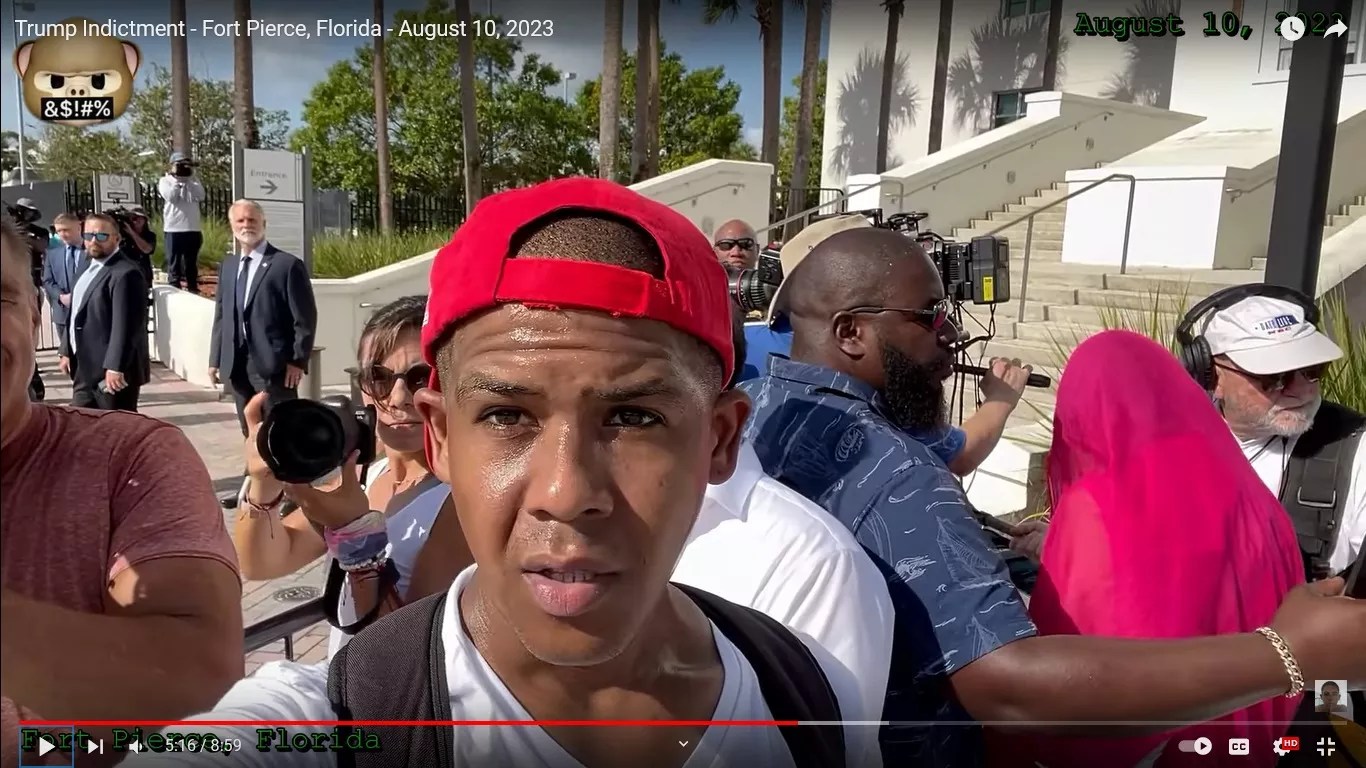
Screenshot via Ragomonkey/YouTube

Audio By Carbonatix
In no uncertain terms, Miami-Dade County police told YouTuber Ragomonkey to stay away from county commissioner Kevin Cabrera after he called Cabrera “a bootlicker” and said he “should have slapped him in his face” at a commission meeting.
It was not an unusual outing for Rafael Gomez, AKA Ragomonkey, a First Amendment activist with a penchant for chafing officers and local politicians. He’s known to ruffle feathers in the county meeting room, flip off police on the street, and push the limits of free speech occasionally to the point where he’s been detained or arrested.
In this instance, however, he was neither charged with a crime nor given a court date, he says.
On May 16, Gomez says, Sergeant at Arms Albert Acosta tried to issue him a stay-away order over his comments at the April meeting but provided no legal documents or judge’s authorization to back it up.
While Gomez maintained his comments about Cabrera were a joke, police determined he made “a threat to a government employee/politician,” according to the police report. Acosta told Gomez that “those types of statements are taken very seriously.”
The encounter raises legal questions not only regarding the First Amendment implications of Gomez’s comments about striking Cabrera, but whether the police were illegally trying to banish Gomez from Cabrera’s presence and county commission meetings by extension.
“Officer Acosta…informed Mr. Rafael Gomez that he was being issued a four-month stay away order from Commissioner Cabrera,” a police report obtained by New Times states.
An Instagram video posted by Gomez shows the April 18 exchange with Cabrera, which kicks off when Gomez asks the commissioner, “Yo, papa, sir, why are you such a bootlicker?”
“Probably like you,” Cabrera responds.
“I don’t lick boots,” Ragomonkey says.
“You lick other things,” Cabrera says as he walks away before turning around and blowing a kiss at Gomez.
“I should have slapped him in his face, right? Bah!” Gomez says with a chuckle.
Legal experts tell New Times that regardless of what Gomez uttered, Florida police do not have the power to hand out a restraining order without authorization from a court.
“I am unaware of any Florida law that gives police the enforceable power to unilaterally order someone to stay away from another person,” criminal defense attorney Mark Eiglarsh tells New Times. “Absent a restraining order, issued after a hearing in front of a judge, I do not believe that the police’s stay away order has any legal validity.”
The Miami-Dade police’s “threat assessment” sheet on the Ragomonkey incident states under the disposition section: “No action/resolved on scene.”
When reached by New Times, Gomez said, “I never got a court order.”
“The First Amendment does not allow a prior restraint, much less one that was without judicial process,” says Michael Barfield, director of public access for the Florida Center for Government Accountability, a nonprofit open government watchdog.
“It is also important to note that the First Amendment does not protect threats,” Barfield says.
Last December, New Times described how cops often take center stage on Gomez’s social media platforms as he pushes First Amendment boundaries. Gomez is part of the popular First Amendment auditing community, which aims to record police officers and other government employees while testing their knowledge of constitutional rights.
He is known for his often scathing approach that includes hurling insults at officers and politicians. In a recent video, he called U.S. Rep. Debbie Wasserman Schultz a “weasel face.” Another clip shows him crying out to police, “Eat a dick, you faggot.”
When Gomez insults local officials, his speech is generally protected by the First Amendment no matter how offensive his comments, but references to violence are a thornier matter under constitutional law.
The U.S. Supreme Court has found that “true threats” – “serious expression” conveying that a speaker means to “commit an act of unlawful violence” – are not protected under the First Amendment. Though the line is not always obvious between a true threat and one made in jest or as hyperbole, the high court recently clarified its standard.
“The State must show that the defendant consciously disregarded a substantial risk that his communications would be viewed as threatening violence,” Justice Elena Kagan wrote for the majority in a June 2023 decision in Counterman v. Colorado.
Gomez has been facing legal troubles in South Florida apart from the Cabrera exchange.
At trial, Gomez was led out of court on April 26 in handcuffs as police applauded his sentence to serve “7 days straight” in county jail after his conviction for misdemeanor resisting arrest without violence. The charge stemmed from an October 2022 incident in which Gomez “failed to obey/comply with a lawful order” and move away from a traffic-stop scene, a Sweetwater police report alleged.
When asked if he would attend the next Miami-Dade County Commission meeting on September 6, Gomez told New Times: “I am not going back until December.”